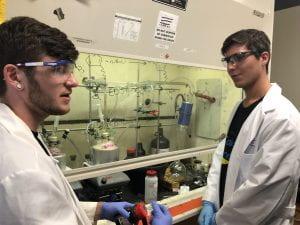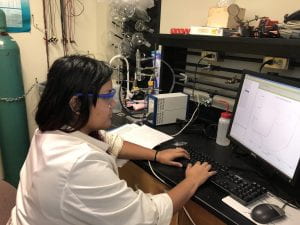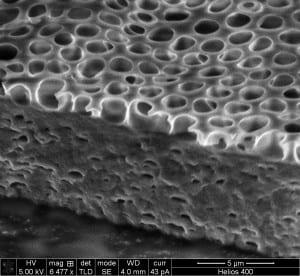Electroactive Polymers:
- Switch reversibly between multiple oxidation states
- Also known as conducting polymers or inherently conducting polymers
- Variable property control: color/size/permeability/conductivity/reactivity
- Applications: energy storage, LEDs, electrochromics, sensors, static discharge, etc.
- Can be p-doped (positive charges formed along the polymer chain) or n-doped (negative charges formed along the polymer chain)

Aligned polymer nanofibers coated with electroactive polymer
Research Interests:
- Synthesis of stable n-doping polymers
- Functionalizing electroactive polymers with biomolecules for use as biosensors (with T. Betancourt)
- Templating to improve electroactivity
- Ion mobility in electroactive polymers
- Nanoparticle coating and reactivity
- Improving electrochemical capacitor stability and capacity
- Ionic liquids as dopants in electroactive polymers
- Design of electroactive polymers for photothermal ablation of tumors (with T. Betancourt)
- Preparation of high molecular weight, soluble electroactive polymers
- Preparation of electroactive nanofibers for applications including water purification and nerve regeneration

Recent MS Chemistry grad David Hebert (left) teaches visiting REU student Tim Carrum (right) about coupling reactions.
Student Learning Opportunities:
- Synthesis of novel organic molecules, such as functionalized heterocycles
- Polymer synthesis
- Purification and characterization of organic small molecules and polymers
- Morphology studies
- Electrochemical characterization
- Device fabrication and testing
- Nanoparticle coating and characterization
- Polymer electrospinning

Master’s student Marisa Snapp-Leo electropolymerizes a new monomer.

